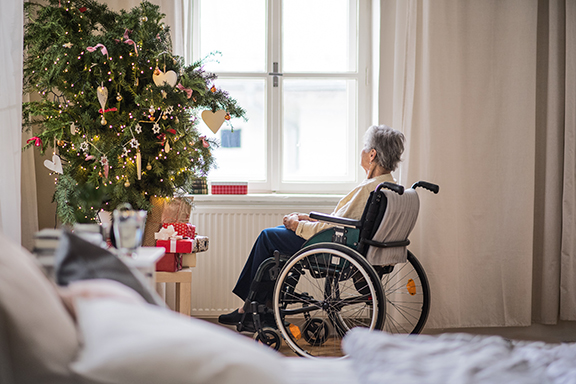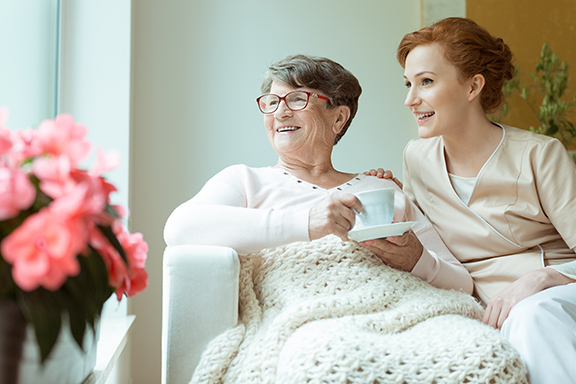Nov 11, 2020
Winter Isolation for Older Adults
Winter is here, and in many parts of the country, it is cold, the days are shorter with more dark than daylight hours, and there may be snow, heavy winds, or other inclement weather conditions. These factors make winter one of the most challenging times for older adults, particularly for adults who live alone. People tend to stay inside more to avoid cold conditions. The culmination of these elements increases older adults’ risk of isolation and depression.

The winter struggle with isolation and depression in older adults is often worsened around the holidays when individuals elect to remain at home rather than bear the cold—in some regions of the country, avoiding snow or icy conditions. Celebrating holiday traditions may fall to the wayside if travel or transportation is more complicated, resulting in older adults feeling lonely or depressed. Similarly, certain friends and family members may no longer be around, bringing emotions of sadness and solitude.
Winter can be a challenging time for anyone! We hope you can use the tips below to help yourself or someone you know fight winter isolation and depression this season.
3 Tips for Older Adults During Winter
1) Accomplish a Daily Goal
Each day, or each evening, set a goal to accomplish at least one thing for that day (or the following). Setting daily goals like going to the grocery store, cleaning up the kitchen, or calling a friend will help you feel accomplished at the end of each day. However small or big the goal may be, setting a goal will help keep you accountable and motivated, and it will help you feel more fulfilled at the end of the day. If you need help to accomplish a goal, reach out to a friend, family member, or neighbor. The simple act of reaching out will help you feel connected with others.
2) Find Activities to do At Home
Make a list of different activities that you can do at home to help your body stay active and your mind engaged. There are many practical activities that you can do at home!

- Clean out your closet (consider donating clothes or coats to people in need)
- Read a book
- Make a scrapbook with old pictures or using holiday catalogs
- Try these seated exercises
- Challenge yourself to learn something new. Perhaps a new game, a new interest, or a new hobby!
- Play a game (word game, card game, online game, apps on phone or tablet)
- Organize a room you’ve been avoiding
3) Reflect on What You Are Thankful For
Make a list or visualize all the people and things you are grateful for this year. Think about all the good memories you have with your partner, dear friends, or family members. While growing older can undoubtedly be tough, consider all the beautiful times you’ve had and everything that brought you to where you are today.
3 Tips for Caregivers During Winter

1) Call and Visit Often
Calling and visiting the person you care for is a great way to check up on them and help them feel connected. Be sure to ask how they are doing, find out if they need anything you can help with, and share what is going on in each of your lives. Being in close communication during the winter is very important to ensuring your care recipient is safe, secure, and connected. Visiting and spending quality time with an older adult you know or care for is especially meaningful during the cold and dark winter months.
2) Ensure Daily Needs are Met
Even more than usual, make sure the person you care for has the essentials they need every day. From adequate food, water, and entertainment, ensure that if bad weather or sickness settles in, your loved-one will have what they need. As the days get shorter, it is easier to skip meals and skip self-care activities. Please do what you can to make sure the person your care for has what they need to be healthy and happy during the winter.
3) Create Meaningful Events and Activities
During the winter months, adults that live alone or spend a lot of time alone often need something to look forward to, especially around the holidays. As a caregiver, consider activities or events to coordinate or attend with the person you care for and visit. Activities like a night out to dinner, a trip to the store, or holiday shopping can help your care recipient feel connected with others and a sense of engagement. There may be charity events or other events in your area (movies, shows, celebrations, volunteer opportunities, galas, silent auctions) that would be opportunities for fun social engagement.
Don’t let Incontinence Keep You Isolated

Adults with incontinence are at a higher risk of isolation due to the nature of the condition. Adults with mismanaged incontinence may avoid social situations where they worry about leaks or odor and its embarrassment. The risk of isolation increases in the wintertime and incontinence may only increase that risk of isolation.
If you or someone you know is dealing with leaks or odors and worries about incontinence, Tranquility is a premium solution that can help regain confidence and dignity. With the increased risk of isolation during the winter months, don’t let incontinence keep you or someone you know in isolation. Tranquility products allow for hours of protection for uninterrupted sleep or daytime activities. Please contact us to receive a free sample and to learn more about how Tranquility can eliminate concerns or worries about incontinence accidents. We’re here to help!
Contact us today!
Email us at service@comfortplusonline.com
Call us at (888) 656-8055
Chat online with us (chat window at the bottom of the screen)

